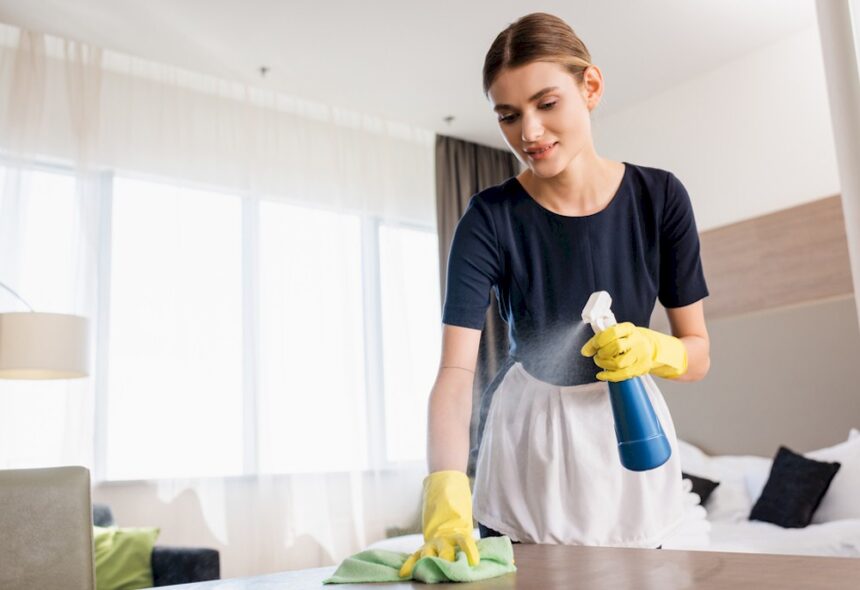Introduction
Professional hotel cleaning services stand at the forefront of creating those memorable guest experiences that distinguish truly exceptional accommodations from merely adequate ones. In an era where health consciousness and hygiene standards have reached unprecedented heights, the meticulous attention to cleanliness has evolved from a simple operational necessity into a critical competitive advantage. Beyond the obvious aesthetic benefits, immaculate environments significantly influence guest satisfaction, online reviews, and ultimately, a property’s financial success in this highly competitive industry.
The Hidden Impact of Cleanliness on Guest Experience
What guests perceive as ‘clean’ extends far beyond the absence of visible dirt. It encompasses a complex sensory experience that operates largely at the subconscious level—a psychological dimension of hospitality that cannot be underestimated.
Studies from Singapore’s hospitality management institutes reveal compelling findings:
- 78% of negative online reviews mention cleanliness concerns
- Guests form critical first impressions within 7 seconds of entering a hotel space
- Properties with exceptional cleanliness command 23% higher room rates on average
- The perception of cleanliness influences booking decisions more than location for 64% of travellers
“The distinction between cleaned and truly sanitised spaces has never been more consequential,” notes a prominent Singapore hospitality consultant. “Today’s guests possess heightened awareness that extends well beyond visible surfaces.”
The Science Behind Effective Sanitisation
Microbial Battlegrounds: Beyond Visual Cleanliness
The modern understanding of hotel sanitisation has been transformed by microbiological research. Areas that appear immaculate to the naked eye may harbour concerning microbial ecosystems. Effective cleaning protocols must address both aesthetic cleanliness and microbial safety—particularly in high-touch areas that serve as transmission vectors.
High-touch surfaces requiring particular attention include:
- Lift buttons and door handles
- Remote controls and light switches
- Bathroom fixtures and toilet flush mechanisms
- Telephones and digital touchscreens
- Bedside tables and minibar handles
Innovative Technologies Transforming the Industry
The evolution of cleaning methodologies has accelerated dramatically, with technological innovations providing unprecedented effectiveness and efficiency.
Electrostatic Spraying Systems
This revolutionary application method enables disinfectants to wrap around surfaces with uniform coverage. The technology applies a positive charge to liquid disinfectants as they pass through the sprayer nozzle, causing the sanitising agents to cling to environmental surfaces with remarkable thoroughness.
UV-C Light Disinfection
Short-wavelength ultraviolet light disrupts the DNA of microorganisms, rendering them incapable of reproducing. This chemical-free approach has proven particularly valuable for sensitive electronic equipment and fabrics that cannot withstand harsh disinfectants.
The Rising Importance of Air Quality Management
While surface sanitation remains essential, increasing attention is now being directed toward air quality management in hotel environments. The transmission of airborne pathogens has emerged as a significant concern that comprehensive cleaning programmes must address.
Advanced properties now implement:
- HEPA filtration systems that capture particles as small as 0.3 microns
- Regular duct cleaning protocols to prevent contamination
- Air quality monitoring systems with real-time data reporting
- Negative pressure rooms for isolation capabilities when needed
- Natural ventilation optimisation where architectural design permits
“The invisible aspects of cleanliness—particularly air quality—represent the new frontier in hospitality hygiene,” explains a Singapore environmental engineer specialising in indoor air quality. “The most forward-thinking properties now consider air as a critical element requiring the same meticulous attention as visible surfaces.”
“These technological advances allow for sanitisation that would have been impossible even five years ago,” observes a Singapore-based environmental health researcher. “The hospitality industry now benefits from methodologies previously limited to healthcare settings.”
The Human Element: Training Excellence
While technology provides valuable tools, the human component remains irreplaceable. Comprehensive training programmes that develop both technical proficiency and attention to detail constitute the foundation of exceptional hotel cleanliness.
Effective training programmes include:
- Detailed cleaning sequences optimised for efficiency
- Cross-contamination prevention protocols
- Chemical safety and appropriate product selection
- Specialised techniques for difficult materials and surfaces
- Quality verification procedures and accountability systems
Sustainability Without Compromise
The False Dichotomy of Clean vs. Green
For too long, the hospitality industry operated under the misconception that environmental responsibility necessarily entailed compromised cleanliness. This perspective has been thoroughly dismantled by innovations in green cleaning technologies.
“The integration of sustainable practices with rigorous sanitisation represents one of the most significant advancements in hospitality operations,” notes a Singapore sustainability expert. “Properties now achieve superior cleanliness while dramatically reducing environmental impact.”
Key sustainable cleaning innovations include:
- Microfibre systems that reduce water consumption by up to 95%
- Plant-based disinfectants with efficacy matching traditional chemicals
- Energy-efficient equipment that reduces carbon footprint
- Concentrated products that minimise packaging waste
- Water reclamation systems for cleaning operations
The Future of Hotel Hygiene
Predictive Cleaning and Resource Optimisation
The integration of data analytics into cleaning operations represents the frontier of hospitality management. Occupancy patterns, seasonal factors, and historical data now inform resource allocation with unprecedented precision.
Advanced properties employ systems that predict cleaning requirements based on:
- Real-time occupancy fluctuations
- Weather conditions affecting soil levels
- Special events generating unique cleaning challenges
- Seasonal allergy forecasts requiring enhanced protocols
- Historical patterns of room usage and turnover speeds
Conclusion
The transformation of hotel cleaning from basic housekeeping to sophisticated sanitisation science reflects broader shifts in both technological capability and guest expectations. The properties that distinguish themselves in the coming years will be those that embrace innovation while maintaining an unwavering commitment to excellence in execution. As travellers become increasingly discerning about health and well-being during their journeys, the competitive advantage will belong to those establishments that recognise cleanliness not merely as an operational function but as an essential component of the guest experience—a philosophy that must permeate every aspect of the hotel cleaning.





